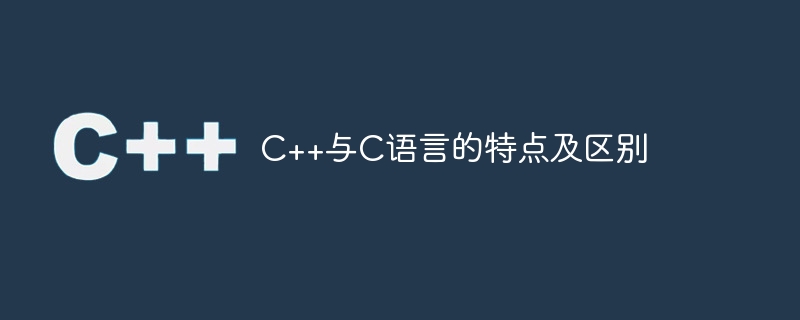Home >Backend Development >C++ >Characteristics and differences between C++ and C language
Characteristics and differences between C++ and C language
- 王林Original
- 2024-03-25 22:51:03483browse

C language and C language are two widely used programming languages, each with its own unique characteristics and uses. This article will explore their characteristics and differences, and demonstrate the differences between them through specific code examples.
1. Characteristics of C language:
- Procedural programming: C language is a procedural programming language that mainly focuses on the execution sequence and logic of the program. The program is decomposed into multiple function to implement.
- Simple and efficient: The syntax of C language is concise and clear, with low learning threshold and high execution efficiency. It is suitable for program development that has requirements on performance and resource consumption.
- Powerful pointer operation: C language supports pointer operation, which can directly operate on memory addresses. It has high flexibility, but it can also easily cause problems such as memory leaks.
- Suitable for system-level programming: Because C language has the ability to directly operate memory, it is suitable for system-level programming, operating systems, compilers and other low-level development fields.
2. Characteristics of C language:
- Object-oriented programming: C is a language that supports object-oriented programming and introduces classes, inheritance, encapsulation, and polymorphism. Features such as this improve code reusability and maintainability.
- Rich standard library: C provides a rich standard library, including containers, algorithms, input and output, string processing, etc., providing more tools and functions.
- Support generic programming: C supports generic programming, that is, template programming, which can implement more versatile code.
- Higher level of abstraction: C provides a higher level of abstraction than the C language, paying more attention to the relationship between objects and data, making the code easier to understand and maintain.
3. The difference between C language and C language:
- Syntax difference: C introduces object-oriented features on the basis of C language, adding classes and objects , inheritance and other syntax. For example, a structure in C is called a class in C.
- Compilation method: C language and C language are different in the compilation method. C introduces stages such as preprocessing, compilation, assembly, and linking, while C language only has three stages: preprocessing, compilation, and linking.
- Complexity: C is more complex than C language, introducing more concepts and syntax, requiring more learning and understanding.
- Application fields: C language is suitable for system-level programming and embedded development, while C is more suitable for large-scale software development, graphical interface programming and other fields.
Next, we use specific code examples to show the differences between C language and C language:
C language example code:
#include <stdio.h>
int main() {
int a = 10;
int b = 20;
int sum = a + b;
printf("Sum: %d
", sum);
return 0;
}C example Code:
#include <iostream>
int main() {
int a = 10;
int b = 20;
int sum = a + b;
std::cout << "Sum: " << sum << std::endl;
return 0;
}In the above example, you can see that the C language uses printf function output, while C uses std::coutobject coordinationOperator output. This demonstrates that the C language introduces more object-oriented features to simplify code writing and provide better readability.
In summary, C language and C language each have their own characteristics and applicable scenarios. Developers can choose the appropriate language for development according to specific needs. When weighing the choice between the two, you must not only consider performance and complexity, but also the scale and functional requirements of the project. Choosing the language that best meets the needs can improve development efficiency and code quality.
The above is the detailed content of Characteristics and differences between C++ and C language. For more information, please follow other related articles on the PHP Chinese website!

